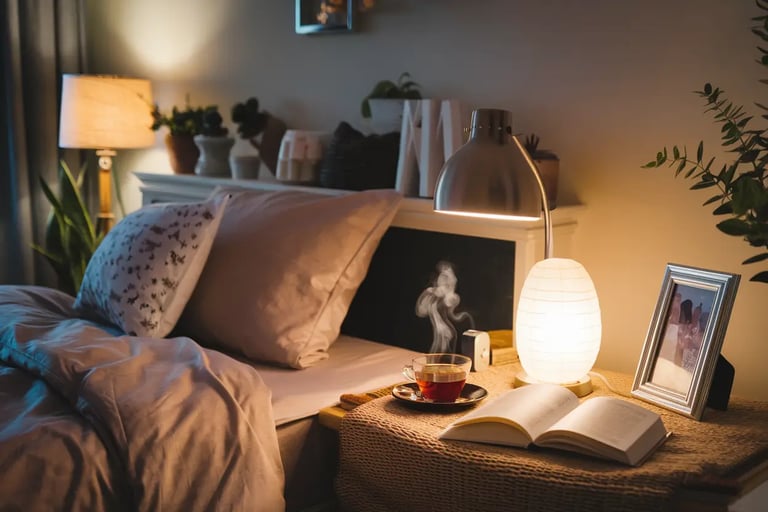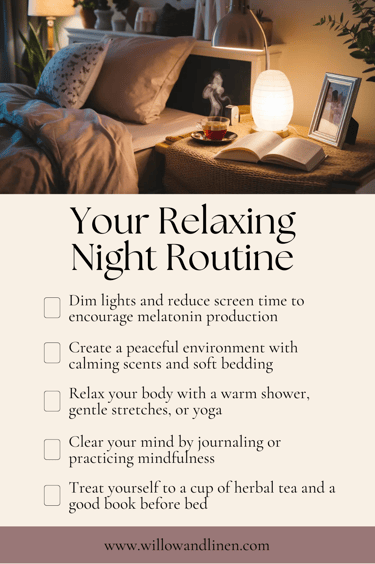10 Ways to Create a Relaxing Night Routine for Better Sleep
WELLNESS


There’s something undeniably magical about getting a good night’s sleep. You wake up refreshed, energized, and feeling like you can conquer the world. But for so many of us, that kind of sleep feels like an elusive dream. Between the endless to-do lists, late-night scrolling, and our minds replaying awkward memories from years ago (why does it do that?), falling asleep can be a real challenge.
Here’s the thing: good sleep doesn’t just happen. It’s something we prepare for, and one of the best ways to do that is with a relaxing night routine. A well-crafted routine not only helps you fall asleep faster but also transforms the whole bedtime experience into something you look forward to—a moment of calm in an otherwise busy life. Let’s dive into ten ways you can create a night routine that leaves you sleeping soundly and waking up ready to take on the day.
1. Dim the Lights (and Your Screen)
We all know that the glow of our screens isn’t doing us any favors at bedtime, yet how many of us still scroll through TikTok or binge-watch our favorite shows right before bed? Guilty. The problem is that blue light from screens interferes with your body’s production of melatonin, the hormone that tells your brain it’s time to sleep.
Instead of going cold turkey on screen time (let’s be realistic), try making small changes. Set your devices to “night mode” or use apps that reduce blue light. Better yet, make it a habit to put your phone down at least an hour before bed. Dim the lights in your home and switch to softer, warmer lighting in the evening. Trust me, it creates a cozy vibe that makes you want to wind down. If you’re not ready to give up your screen entirely, try replacing doom-scrolling with something calming, like watching ASMR or guided meditations. Baby steps.
2. Create a Calm Environment
Your bedroom should feel like a sanctuary, not a storage unit. A cluttered room leads to a cluttered mind, so take a few minutes each day to tidy up. Think of it as setting the stage for relaxation. Soft, breathable bedding is a must—opt for materials like cotton or linen for ultimate comfort. And don’t underestimate the power of scent. Lavender, chamomile, or even vanilla can create a soothing atmosphere. Use a diffuser, pillow spray, or even a candle to fill the space with calming aromas.
Another game-changer? Invest in blackout curtains. If you’ve ever woken up at 6 a.m. because of sunlight streaming through your windows, you know how important it is to control the lighting in your room. A sleep mask works too if blackout curtains aren’t an option. Lastly, if noise tends to disrupt your sleep, a white noise machine or even a simple fan can help drown out distractions.
3. Take a Warm Shower or Bath
There’s something incredibly soothing about stepping into a warm shower or sinking into a bath after a long day. It’s like washing away the stress, both literally and figuratively. But did you know that it’s also scientifically proven to help you sleep better? A warm shower or bath helps lower your core body temperature, which signals to your body that it’s time to rest. This drop in temperature mimics the natural process your body goes through as it prepares for sleep.
To enhance the experience, add a few drops of essential oils like lavender or eucalyptus to your bath. Light some candles, play calming music, and make it a full sensory experience. If you’re short on time, even a quick warm shower can do wonders. Bonus: You’ll get into bed feeling clean and cozy, which is an underrated luxury.
4. Journal Your Thoughts
Ever find yourself lying in bed, staring at the ceiling, replaying every awkward interaction you’ve ever had? Same. That’s where journaling comes in. Taking just five to ten minutes to write down your thoughts can help clear your mind and ease any lingering worries from the day.
You don’t have to be a poet or a novelist—just let your thoughts flow. Write about your day, list things you’re grateful for, or jot down any tasks for tomorrow so they’re not bouncing around your brain all night. If you’re new to journaling, a guided journal with prompts can be a great place to start. My favorite? One that encourages me to reflect on the good parts of the day, no matter how small. It’s amazing how much lighter you feel after putting your thoughts on paper.
5. Try Gentle Stretching or Yoga
If you carry tension in your shoulders, back, or neck (hello, laptop posture), gentle stretching or yoga before bed can be a game-changer. It doesn’t have to be an intense workout—just a few simple movements to release physical tension and calm your mind.
Start with stretches that target areas where you hold the most stress, like forward folds for your lower back or neck rolls to release tightness. Pair the stretches with deep breathing—inhale for four counts, hold for four counts, and exhale for six counts. This not only relaxes your muscles but also signals to your nervous system that it’s time to wind down. Even five minutes of stretching can make a noticeable difference in how relaxed you feel when you climb into bed.
6. Sip on a Herbal Tea
There’s something deeply comforting about ending your day with a warm cup of tea. Herbal teas like chamomile, peppermint, or valerian root are natural sleep aids, helping to calm your mind and prepare your body for rest. Make it part of your routine to brew a cup about an hour before bed and sip it slowly while you read or journal.
The ritual itself can be incredibly grounding—it’s like giving yourself permission to pause. Just be mindful to avoid caffeinated teas, as even small amounts of caffeine can interfere with your ability to fall asleep. Personally, I love a mix of chamomile and lavender tea—it’s like a warm hug in a mug.
7. Limit Late-Night Snacking
We’ve all been there: standing in front of the fridge at 10 p.m., debating whether we really need that extra slice of cake. While an occasional treat won’t hurt, heavy meals or sugary snacks too close to bedtime can disrupt your sleep. Instead, opt for a light snack if you’re genuinely hungry—something like a banana, which contains natural sleep-promoting nutrients like magnesium and potassium.
If late-night cravings are more of a habit than a necessity, try drinking water or herbal tea to curb them. Keeping your meals balanced throughout the day can also help reduce the urge to snack late at night.
8. Set a Consistent Bedtime
Consistency is one of the most underrated secrets to better sleep. Going to bed and waking up at the same time every day helps regulate your internal clock, making it easier to fall asleep and wake up feeling refreshed. While it’s tempting to stay up late on weekends, sticking to a routine as much as possible will pay off in the long run.
Think of your bedtime as an appointment with yourself—non-negotiable and just as important as any other part of your day. Over time, your body will start to recognize the rhythm, and you’ll find it easier to drift off naturally.
9. Practice Mindfulness or Meditation
A busy mind can be one of the biggest barriers to sleep. Practicing mindfulness or meditation before bed can help quiet those racing thoughts and bring you into the present moment. You don’t need to be an expert—there are plenty of apps like Calm or Headspace that offer guided meditations specifically designed for sleep.
Even a simple breathing exercise can work wonders. Close your eyes, place a hand on your stomach, and focus on slow, deep breaths. The goal isn’t to clear your mind completely—it’s to gently redirect your focus away from stress and toward relaxation.
10. Read Something Light
There’s a reason so many people swear by reading before bed—it’s one of the easiest ways to transition from the chaos of the day to a state of calm. Choose something light and uplifting, like a heartwarming novel or a collection of short essays. Avoid anything too thrilling or suspenseful, as it might keep you up longer than planned (looking at you, psychological thrillers).
Sweet Dreams Await
A relaxing night routine isn’t about perfection—it’s about creating small, intentional moments that help you unwind and prepare for restful sleep. Experiment with these tips, find what resonates with you, and turn bedtime into the most peaceful part of your day. Sleep tight!






Willow & Linen
Embrace slow living and create cozy moments.
let's stay in touch
© 2024. All rights reserved.
